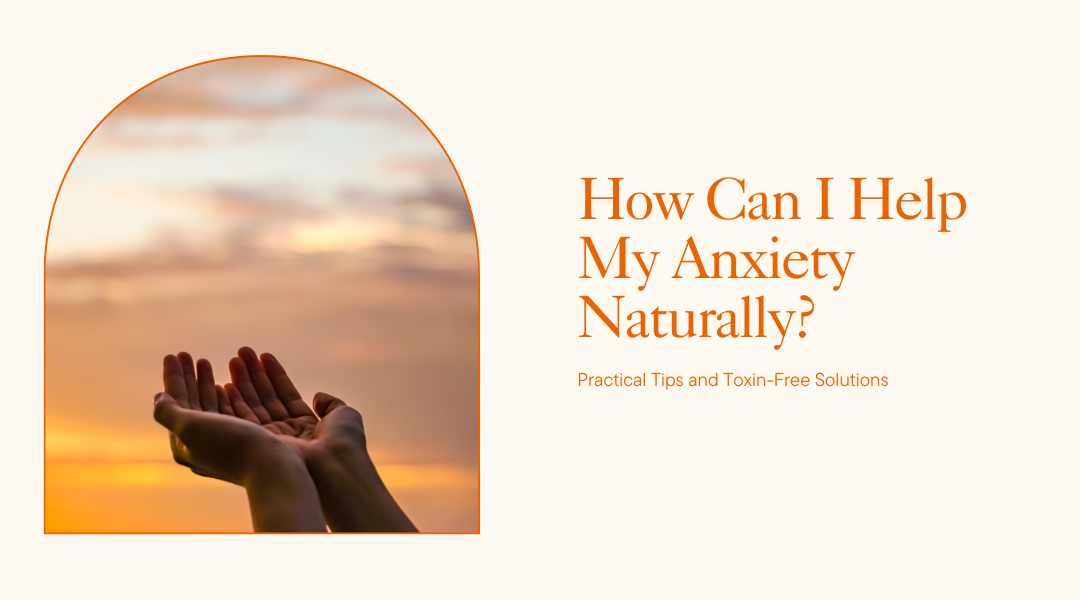Anxiety can feel overwhelming, but it doesn’t have to control your life. While medications and therapy are often effective, there are also natural, practical steps you can take to reduce anxiety and regain a sense of calm.
In this guide, we’ll explore natural remedies for anxiety, lifestyle changes that promote mental well-being, and hidden toxins in your home and diet that could be exacerbating your symptoms.
1. Nourish Your Body with Anxiety-Reducing Foods
Your diet plays a significant role in your mental health. Certain foods can help stabilize your mood and reduce anxiety, while others may make symptoms worse.
Foods That Reduce Anxiety:
- Fatty Fish (Salmon, Sardines, Mackerel): Rich in omega-3 fatty acids, which are essential for brain health.
- Leafy Greens (Spinach, Kale): High in magnesium, a mineral that supports relaxation.
- Probiotic Foods (Yogurt, Sauerkraut, Kimchi): Support gut health, which is closely linked to mental health.
- Chamomile Tea: Known for its calming properties.
Foods to Avoid:
- Refined Sugar: Spikes blood sugar levels, leading to mood swings and increased anxiety.
- Caffeine: Can overstimulate the nervous system, worsening anxiety symptoms.
- Artificial Additives: Found in processed foods and linked to mood disturbances.
2. Detox Your Home to Reduce Anxiety Triggers
Hidden toxins in your home environment may contribute to feelings of anxiety by disrupting your hormonal balance or nervous system.
Common Toxins to Avoid:
- Synthetic Fragrances: Found in air fresheners, candles, and cleaning products, these can release harmful volatile organic compounds (VOCs).
- BPA and Phthalates: Present in plastics, these endocrine disruptors can affect mood-regulating hormones.
- Pesticides: Residues on non-organic produce can interfere with brain function.
Easy Swaps for a Toxin-Free Home:
- Use unscented or essential oil-based cleaning products.
- Choose glass or stainless-steel containers instead of plastic.
- Opt for organic produce when possible to reduce pesticide exposure.
3. Incorporate Calming Daily Habits
Adopting simple, daily practices can help soothe anxiety and provide mental clarity.
Practical Tips to Reduce Anxiety Naturally:
- Practice Deep Breathing: Deep, diaphragmatic breathing activates the body’s relaxation response. Try the 4-7-8 method: inhale for 4 seconds, hold for 7 seconds, exhale for 8 seconds.
- Move Your Body: Regular exercise releases endorphins, which are natural mood boosters. Even a 20-minute walk can reduce anxiety.
- Get Outside: Spending time in nature has been shown to lower cortisol (stress hormone) levels.
- Create a Bedtime Routine: Poor sleep can heighten anxiety. Establish a calming nighttime ritual, like reading or meditating, to improve your sleep quality.
4. Support Your Mind with Natural Supplements
Natural supplements can be an effective addition to your anxiety-relief toolkit.
Supplements to Consider:
- Magnesium: Known as the “relaxation mineral,” it can help ease anxiety and muscle tension.
- Ashwagandha: An adaptogen that helps the body manage stress.
- L-Theanine: Found in green tea, it promotes relaxation without causing drowsiness.
- B Vitamins: Essential for a healthy nervous system and stress management.
Note: Always consult a healthcare professional before starting any new supplements.
5. Identify Anxiety Triggers in Your Life
Sometimes, identifying and managing external stressors can significantly reduce anxiety.
Potential Triggers:
- Digital Overload: Constant notifications and screen time can overstimulate the brain. Set boundaries with technology by using “do not disturb” mode or creating screen-free zones in your home.
- Toxic Relationships: Surround yourself with people who uplift and support you.
- Overcommitment: Learn to say no to unnecessary obligations to protect your mental health.
Pro Tip: Keep a journal to track patterns and triggers that exacerbate your anxiety.
6. Practice Mindfulness and Relaxation Techniques
Mindfulness and relaxation techniques help you stay present and reduce overthinking, a common component of anxiety.
Techniques to Try:
- Meditation: Apps like Calm and Headspace offer guided meditations tailored to anxiety relief.
- Yoga: Combines physical movement with mindful breathing, promoting relaxation.
- Journaling: Write down your thoughts and feelings to process them more effectively.
7. Seek Professional Support When Needed
If anxiety feels unmanageable despite your best efforts, reaching out for professional help is a sign of strength, not weakness.
Options for Support:
- Therapists and Counselors: Cognitive Behavioral Therapy (CBT) is particularly effective for anxiety.
- Holistic Practitioners: Naturopaths and functional medicine doctors can help address root causes like hormonal imbalances or nutrient deficiencies.
Conclusion
Anxiety can feel all-encompassing, but with small, intentional changes to your diet, environment, and daily routine, you can find relief naturally. Start by addressing hidden toxins in your home and food, incorporate calming habits, and consider natural supplements to support your journey.
Remember: Healing takes time. Be kind to yourself as you work toward a healthier, calmer state of mind.
Ready to take the first step? Download my free Low-Tox Living Guide to help detox your home and create a supportive environment for anxiety relief.
Looking for a more comprehensive wellness guide? Check out my seasonal wellness bundles to help you thrive in every season!
